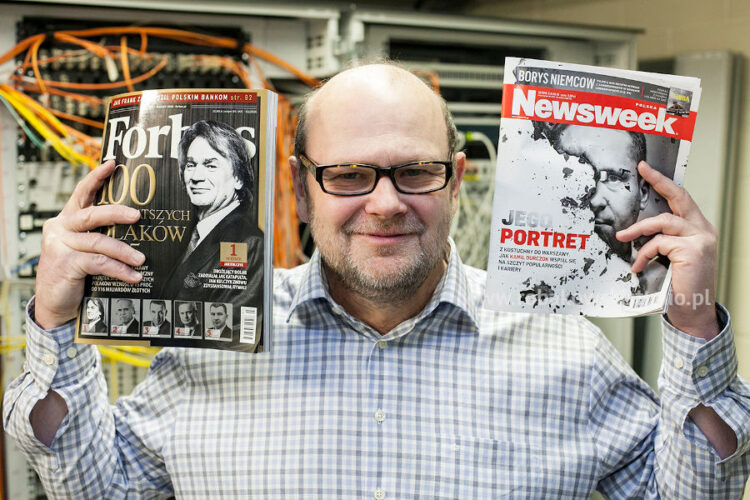The role of IT in the process of business changes
Purchases of new companies, a spin-out of a new organizational unit, consolidations, acquisitions, mergers… In business, such transactions are a commonplace. In the media market, which has recently changed very much (e.g. the introduction of new electronic media, the crisis of traditional print media), there are a lot of ownership changes.
The consequence of the sale or purchase of a business entity is usually a business reorganization project: unification of the organizational structure, development of a new strategy of operation in key areas, establishment of development directions. IT systems are also important aspects of such a project. In the case of a merger, it is important to incorporate the newly acquired entity into the structures of the corporate system landscape, and especially to cover it with an ERP system, i.e. to carry out the so-called rollout.
BCC (now All for One Poland), a provider of SAP solutions and services, has many years’ experience in the implementation of projects of rolling out a corporate solution to a new company/business unit. There are two basic models among numerous strategies of the SAP rollout to a new entity which already has its SAP ERP system. In the first one, the headquarters aims at achieving the biggest possible consistency of business processes in the system by “imposing" its solutions as superior and allowing deviations from the corporate template only if they are required by other legislation (e.g. differences in labour law and tax law in various countries). Such a model dominates in corporations with a highly complex corporate template that run homogeneous business in a variety of companies.
At the other extreme, there is a model that assumes leaving for the company being included into the corporation much freedom in the use of the system, and unification only at the level of reporting for the management board. This strategy works when a new entity in the group runs a completely different type of business or differences in the implemented business processes are large, and the reorganization would involve a costly business and IT project.

The project of the corporate rollout of the SAP solution of Ringier Axel Springer to the Onet Group falls somewhere in the middle of this scale.
Both companies have a similar business model – they are media companies whose main source of income is the advertising sales. Before the merger, both entities represented different philosophies of using IT systems, mainly SAP and domain-specific systems.
One of the principal objectives of the rollout was an advanced standardization of business processes – and their mapping in the systems – in the enlarged Ringier Axel Springer Poland group.
The Onet Group has been using the SAP ERP system since 2011. The installation covers key areas: finance and controlling (FI/CO), sales (SD) and purchasing (MM). In addition, many SAP Business Intelligence reporting tools have been implemented for finance, controlling and purchasing.
A characteristic feature of the SAP installation in Onet.pl was that it was a platform integrating multiple industry-specific applications (supporting sales and publication of advertisements). An extensive use of domain-specific IT solutions is specific to Polish companies in the media market. The system landscape is very rich, most of the systems are connected with SAP (the use of the SAP Process Integration). The platform has many custom extensions prepared in accordance with the needs of Onet.
Ringier Axel Springer represents a different philosophy of working with SAP. First of all – the system is used by companies in many countries, including Poland, Hungary, Slovakia and Serbia. So it is governed by other priorities, mainly aiming at coherence and unification, with a small margin of deviations and local configurations. For this reason – in order to follow the corporate policy – the Polish subsidiary uses domain-specific solutions to a very small extent. Like in SAP ERP templates in other international corporations, the reporting area is very extensive both at the local level, as well as for the purposes of the headquarters.
A new sales model, a new system
However, before the commencement of the work in the “big" rollout, it was necessary to carry out a separate project – as a consequence of the business reorganization – of the sales system preparation for the new company Media Impact Poland.
Media Impact Poland was formed by merging the existing sales departments of both entities, and was founded to centrally handle the advertising sales for all media of the group. In this project, the biggest challenge was the issue of (short) time. The IT project was launched in November 2013, and the company started its operation already at the beginning of 2014. It was decided to take over SAP SD, a solution proven already in Onet, and to make in it necessary changes resulting from the specific features of Ringier Axel Springer processes. The adjustments in the SD area concerned mainly corporate requirements regarding the posting parameters, as well as the organizational structure and document flow.
At this first stage, the Onet template for the integration with domain-specific systems of key importance to the group was used.
The use of the “out-of-the-box" system enabled tight deadlines to be met and the business risk to be minimized. The advertising sales by the new entity, in the new system was started as planned.
Key areas of changes
Covering of the Onet.pl Group with the central SAP system of Ringier Axel Springer and adjustment of the Onet installation to corporate standards was one of the elements of the business reorganization and consolidation. The rollout work was carried out in 2014 with the participation of BCC.
The SAP system of the Onet Group is a mature installation, well-adjusted to the specific nature of the business, industry standards, with an extensive reporting area. So there was no need to “discover America again" at the operational level. These arguments were taken into account when a new IT strategy was developed. In addition, business safety aspects (a project involving users as little as possible and changing their existing model of working with the system, reduction of the risk related to a significant change of processes) and financial aspects (a project with fewer changes means a smaller budget) turned out to be important.
Finally, it was decided to use the model of keeping the “old" solution for Onet, and to make changes necessary to meet the reporting requirements of the headquarters and to ensure coherence of financial reporting both for the purposes of owners and government authorities.
Even with these assumptions, the project of a corporate SAP installation rollout to a local company usually involves many typical activities unifying the systems, such as the remapping of a chart of accounts, the remapping of document types, the adjustment of numbering of master data and documents, the use of existing master data common to companies of the group with an extension for the purposes of migrated entities.
The biggest changes made to the system for Onet resulted from a different approach to investment management in SAP (the so-called fixed assets under construction). Ringier Axel Springer attaches great importance to the settlement of costs of new investments (portals, new publishing initiatives, etc.). To this end, the company uses the functionality of investment orders, assigning and accounting for all capital expenditures by individual investment projects.
In Onet, such accounting was not practiced and it was necessary to customize SAP tools in this area, taking them into account in business processes, according to the specific requirements of the corporation.
Another area of adjustments was the consolidated reporting that is much more complex in Ringier Axel Springer Poland. It covers functional areas and includes additional reporting levels.
Another difference is the use of the New General Ledger in Onet versus the “old" version of the General Ledger in the group. Ringier Axel Springer Poland is not planning any migration to the New General Ledger now, so it was necessary to introduce changes in the solution transferred to the new platform in order to ensure the continuity of the solution operation without the use of structures and mechanisms of the New General Ledger.
The Onet installation includes SAP MM functionalities for materials management. They are used mainly for the management of purchasing of hardware and software. It was decided to leave the handling of this process unchanged, which entailed adding of SAP MM to the corporate template and its integration at the controlling level.

Marek Górecki, IT Director, Ringier Axel Springer Polska
Enhancement of the system, business security
The main objective of the rollout of the SAP system of Ringier Axel Springer to Onet.pl was to develop a solution that would effectively support the company’s entire business in Poland, while providing an efficient and consistent reporting platform for the purposes of the management board. On the side of the ERP system management, this goal can be achieved by ensuring the consistency of the corporate system template. However, we must be aware that the system – like business – is alive and SAP configuration changes resulting from the changing business and reporting needs, including the acquisition of new entities in the group and organizational changes related to the integration of the group companies at the operational level, are inevitable.
The merger of both companies was a good opportunity to enhance our system with new solutions that had proved their worth in Onet earlier and fitted in our philosophy of the centralized system management.
The SAP corporate template is an informational “bloodstream" that ensures consistent reporting operations at the management board level. The prerequisite for any change is a guarantee of the business security and undisturbed operation of the developed business model.
Especially in large organizations, the role of the IT leader is to safeguard the consistency of corporate systems, taking into account the business needs of various stakeholders in the context of the stability of the systems and maintaining a consistent configuration template at the group level. In view of the changing internal and external requirements, the IT head is responsible not only for ensuring the security and continuous operation of the application. Initiating changes in systems and changes in the business needs as well as organizational changes, the IT head is a partner assuming the responsibility for the outcome of the company.
Marek Górecki, IT Director, Ringier Axel Springer PolandProject challenges
In the model of connecting the systems as the one adopted in Ringier Axel Springer Poland, an extremely important factor is the communication between all stakeholders of the project. A good understanding of the business process logic in both entities, decisions on the scope of the necessary changes, reaching compromises between the expectations of the new owner and keeping the existing, proven solutions are the effect of the knowledge transfer and many project meetings of people from the group – both from the Polish subsidiary and from the corporation, employees of the Group Onet.pl and BCC consultants.
A business benefit, a scale of changes, their costs, potential risks, consequences for the performance and coherence of the system, the conclusions from tests – these are just the most important factors that should be taken into account when considering any change to the system.
A detailed concept for connecting complex installations of integrated systems includes both the layer of business solutions, and the technical side. However, even in the best-prepared project, with the maximum involvement of all users, surprises are unavoidable.
In the described project, an example of such an unexpected challenge was a significant decline in the system performance, not related to the number of transactions, after the migration of Onet data to the corporate installation. The problem arose as early as at the time of launching the system for Media Impact Poland, and it became serious in the rollout for Onet and required to be solved urgently.
It turned out that the problems had been caused by differences in the approach to transaction processing (cluster tables versus transparent tables) in both installations. The same system (both installations are SAP ERP 6.0), similar solutions and an unexpected problem that was a consequence of earlier technical decisions in the Basis area. A similar case had not occurred in any of several dozen similar projects previously carried out by BCC (now All for One Poland). It was necessary to search the archives of OSS notes published by the system manufacturer, SAP, to find the cause and the solution. The use of the suggested SAP approach to reading data from cluster tables resulted in a significant acceleration of transactions for the document flow.
Application support for connected systems
Both the Onet Group and Ringier Axel Springer Poland – still as separate entities – used the SAP application support services at BCC. In January of this year – already after the completion of the rollout project – a new agreement was signed with SNP for the user support service covering all SAP installations.
In addition, BCC provides SAP administration services for the PI (Process Integration) module, which is widely used in the Onet installation for the integration of SAP with domain-specific systems.
Pursuant to the signed SLA, experts of the All for One Outsourcing Center support SAP users in Axel Springer in their daily work with the system. All service requests are received at a central point (Service Desk Team) and forwarded by the operator to the relevant team of SAP module specialists.
Consistency of the system, business security
It is difficult to work out a satisfactory target solution, especially in the model such as the one adopted in Ringier Axel Springer Poland, where a coherent corporate system takes into account the interests of various entities of the group, operating in different business realities, in different countries, and the consistency is maintained, ensuring the business security and the fulfillment of the reporting duties for the management board.
The system on which Onet is currently working, “fitted well" the corporate template, and was changed only slightly from the point of view of users. In turn, the SAP corporate template proved so flexible that the incorporation of new Onet processes into it did not affect the business security. In addition, it was enhanced with new areas (SD, MM) and functions that can be wider used in the future.
The business reorganization project is also coming to an end in the company. With the new organizational structure, the new-old SAP system and the new strategy for growth and digitization of the offer, Ringier Axel Springer is ready to achieve its business goals such as: the development of major brands, multimedia expansion and exploration of new areas of business.


